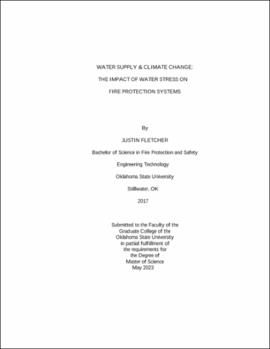| dc.contributor.advisor | Charter, Virginia | |
| dc.contributor.author | Fletcher, Justin | |
| dc.date.accessioned | 2023-08-25T20:05:56Z | |
| dc.date.available | 2023-08-25T20:05:56Z | |
| dc.date.issued | 2023-05 | |
| dc.identifier.uri | https://hdl.handle.net/11244/338910 | |
| dc.description.abstract | Many fire protection systems rely almost entirely on having an adequate water supply to aid in control or suppression of fire. Furthermore, local fire departments also rely on the water supply as a part of their response. If water sources are somehow lost or the supply infrastructure is damaged, the protection system will not work as intended and thus the reliability of suppression systems heavily depends on adequate water supply. This project focuses on how fire protection system design and water supply system design must begin to include the concept of climate change, specifically water scarcity or stress, to the discussion of reliability of systems. | |
| dc.description.abstract | This project conducts a detailed literature review of current water supply practices, design of suppression systems that depend upon the use of water supplies, and the impacts of water stress or scarcity on water supply systems, as well as a gap analysis of what areas need to be researched more from the lens of fire protection systems and climate change. Additionally, the report will include four case studies including: the 2021 Texas, USA Arctic Blast water crisis, 2018 Cape Town, South Africa ‘Day Zero’ water crisis, Spain’s freshwater resource loss, and Australia’s water crisis. By studying these scenarios, the project provides a vast look from rural to urban areas (including the wildland urban interface), as well as differing climates, and varying reasons leading to the water stress or scarcities in the regions. A final source of data is a stakeholder survey focused on plans for and experiences with water shortages. | |
| dc.description.abstract | It is determined that various stakeholders should be involved in the communities planning for a water supply shortage, policies should be developed to help upgrade infrastructure to combat possible shortages, and alternative means of water supply should be considered such as the use of desalination plants to help supplement existing water supplies. | |
| dc.format | application/pdf | |
| dc.language | en_US | |
| dc.rights | Copyright is held by the author who has granted the Oklahoma State University Library the non-exclusive right to share this material in its institutional repository. Contact Digital Library Services at lib-dls@okstate.edu or 405-744-9161 for the permission policy on the use, reproduction or distribution of this material. | |
| dc.title | Water supply and climate change: The impact of water stress on fire protection systems | |
| dc.contributor.committeeMember | Hoskins, Bryan | |
| dc.contributor.committeeMember | McAleavy, Tony | |
| osu.filename | fletcher_okstate_0664m_18207.pdf | |
| osu.accesstype | Open Access | |
| dc.type.genre | Thesis | |
| dc.type.material | Text | |
| thesis.degree.discipline | Engineering Technology: Fire Safety And Explosion Protection | |
| thesis.degree.grantor | Oklahoma State University | |
